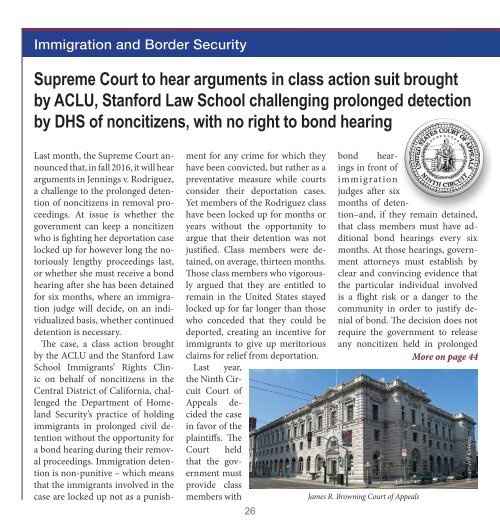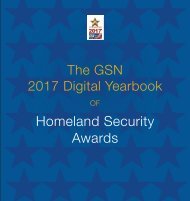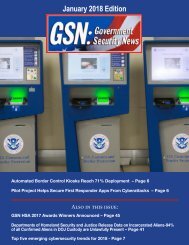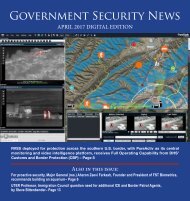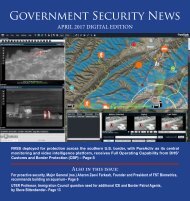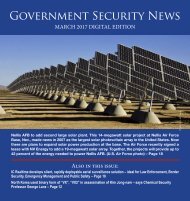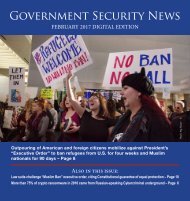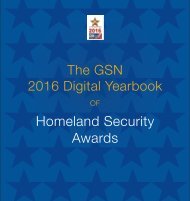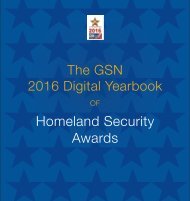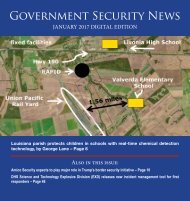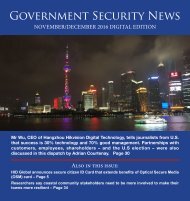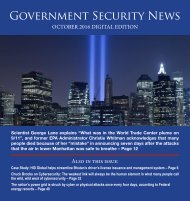Government Security News July 2016 Digital Edition
Government Security News, founded in 2001 shortly after 9/11, is a news and feature publication covering Homeland Security and Defense. It is read by government executives in federal, state, county, municipal agencies as well as technology vendors and service personnel in Law Enforcement, Airport and Aviation Security, Border Security and Immigration, Maritime and Port Security, Disaster Preparedness and Response, Counter-Terrorism, IT and Cybersecurity and all other branches of Government and the Military. In addition to its daily, weekly and monthly publications and newsletters, Government Security News also operates two awards programs that are well-respected in the U.S. and Internationally.
Government Security News, founded in 2001 shortly after 9/11, is a news and feature publication covering Homeland Security and Defense. It is read by government executives in federal, state, county, municipal agencies as well as technology vendors and service personnel in Law Enforcement, Airport and Aviation Security, Border Security and Immigration, Maritime and Port Security, Disaster Preparedness and Response, Counter-Terrorism, IT and Cybersecurity and all other branches of Government and the Military. In addition to its daily, weekly and monthly publications and newsletters, Government Security News also operates two awards programs that are well-respected in the U.S. and Internationally.
Create successful ePaper yourself
Turn your PDF publications into a flip-book with our unique Google optimized e-Paper software.
Immigration and Border <strong>Security</strong><br />
Supreme Court to hear arguments in class action suit brought<br />
by ACLU, Stanford Law School challenging prolonged detection<br />
by DHS of noncitizens, with no right to bond hearing<br />
Last month, the Supreme Court announced<br />
that, in fall <strong>2016</strong>, it will hear<br />
arguments in Jennings v. Rodriguez,<br />
a challenge to the prolonged detention<br />
of noncitizens in removal proceedings.<br />
At issue is whether the<br />
government can keep a noncitizen<br />
who is fighting her deportation case<br />
locked up for however long the notoriously<br />
lengthy proceedings last,<br />
or whether she must receive a bond<br />
hearing after she has been detained<br />
for six months, where an immigration<br />
judge will decide, on an individualized<br />
basis, whether continued<br />
detention is necessary.<br />
The case, a class action brought<br />
by the ACLU and the Stanford Law<br />
School Immigrants’ Rights Clinic<br />
on behalf of noncitizens in the<br />
Central District of California, challenged<br />
the Department of Homeland<br />
<strong>Security</strong>’s practice of holding<br />
immigrants in prolonged civil detention<br />
without the opportunity for<br />
a bond hearing during their removal<br />
proceedings. Immigration detention<br />
is non-punitive – which means<br />
that the immigrants involved in the<br />
case are locked up not as a punishment<br />
for any crime for which they<br />
have been convicted, but rather as a<br />
preventative measure while courts<br />
consider their deportation cases.<br />
Yet members of the Rodriguez class<br />
have been locked up for months or<br />
years without the opportunity to<br />
argue that their detention was not<br />
justified. Class members were detained,<br />
on average, thirteen months.<br />
Those class members who vigorously<br />
argued that they are entitled to<br />
remain in the United States stayed<br />
locked up for far longer than those<br />
who conceded that they could be<br />
deported, creating an incentive for<br />
immigrants to give up meritorious<br />
claims for relief from deportation.<br />
Last year,<br />
the Ninth Circuit<br />
Court of<br />
Appeals decided<br />
the case<br />
in favor of the<br />
plaintiffs. The<br />
Court held<br />
that the government<br />
must<br />
provide class<br />
members with<br />
26<br />
bond hearings<br />
in front of<br />
immigration<br />
judges after six<br />
months of detention–and,<br />
if they remain detained,<br />
that class members must have additional<br />
bond hearings every six<br />
months. At those hearings, government<br />
attorneys must establish by<br />
clear and convincing evidence that<br />
the particular individual involved<br />
is a flight risk or a danger to the<br />
community in order to justify denial<br />
of bond. The decision does not<br />
require the government to release<br />
any noncitizen held in prolonged<br />
More on page 44<br />
James R. Browning Court of Appeals<br />
Photo: Jeff Kubina


